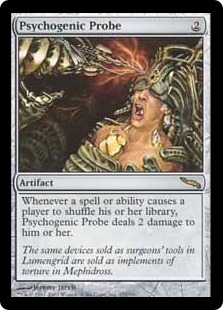It’s hard to deny the variety of tactics that come into play when participating in games of multiplayer Magic, and it’s even harder to deny that what you take away from those games – indeed how you approach them entirely – will be based on your own personal game style.
Some players enjoy a near-hedonist approach. To them, they’ll throw things out there to see what sticks. Sometimes this pans out and they achieve desirable ends, but more often than not things go poorly for them. To them, any win is a bonus, as their main enjoyment is to shake up the game and keep things off tempo.
Other players prefer to “turtle”, playing very defensively in order to buy themselves much needed time. This group thrives on the long game, and they’ll use their arsenal of stalls, counterspells, life gain, spot removal, and more to hold out until they can pull off their grand finale.
On the opposite end of the spectrum lies those who play as if the game needs to end in 20 minutes. If multiplayer metas were a D&D adventuring group, these folks would be your barbarians. There are two things this group abhor when they sit down with a sizable number of players: anything they see as purposely delaying or elongating the game for no reason, and politics. There is no detente, no happy equilibrium. Board wipes are seen as counterproductive, arms races are foolish, and so help you if they think you’re trying to manipulate them into doing anything.
Similarly, you have “I Can’t Shake Being A Duelist” mentality. These guys and gals are the ones who usually bring a knife to the gun fight. Their 1 vs 1 decks are respectfully and impressively good. However, they’re always designed around one opponent – not five. These decks certainly be problematic in a game, but usually their arsenals peter out before they can edge out a win, often having to take solace instead in bringing as many down with them as they can.
And so on.
Simply put, the casual field offers a plethora of stylistic diversity and opportunity for different philosophies, whether that comes from the decks themselves or the people who make them.
Of course, these games – especially Commander – also see their share of repetitive in-game tendencies as well, such as that:
- There is almost always at least one board wipe in multiplayer games.
- There is always a rush for more mana, be it through fetching lands or via artifacts and enchantments.
- A well-timed tutor can change the course of the game.
- Card draw almost always ups your chances of winning.
And
- You should always fear the second most powerful person at the table.
Now, there’s also one other thing you’ll see a great deal of in multiplayer games like Commander. It’s so prevalent in normal games to a point where R&D actually has vocalized a desire to try to mitigate it slightly, meaning it’s even more prevalent with larger tables:
Shuffling.
Really. Fetch a land? Shuffle. Tutor for a card? Shuffle. Slivercycle, Transmute, cast a Beacon, a Zenith, or have a card die that refuses to go into the graveyard? Shuffle, shuffle, shuffle.
In and of itself, shuffling is pretty innocuous. Yet there is a direct correlation between how often a player shuffles their deck and their chances of doing well. Shuffling almost always implies that they’re either getting something out of the deck that they want or putting something back into it. Ergo, the more someone shuffles, the more resources they’re working with.
It’s hard to stop every instance of a player who is routinely fetching lands or other cards from their deck. What we can do instead is make them pay for it.
Today we have: Psychogenic Probe

Name: Psychogenic Probe
Edition: Mirrodin
Rarity: Rare
Focus: Damage Dealing
Highlights: For a mere two mana, this little artifact can find a home in almost any Commander deck. It’s easy to get out, and it addresses a universal function present in most games of the format. Very rarely will there be a game where no one takes damage from it.
That said, it is a bit situational; it won’t do much if no one is shuffling. However, Psychogenic Probe usually isn’t there to be a win condition. Rather, it’s a punishing effect for those trying to get an advantage. Plus, it has staying power. This little probe is rarely a removal target and can sit around for quite awhile without generating a lot of hate most of the time because of two simple facts:
- It’s an equal opportunity offender – you aren’t immune to it either.
- It’s only affecting a secondary facet of the game (as opposed to something like, say Manabarbs or Underworld Dreams). Other players also have a hard time getting upset with a card that punishes someone for tutoring getting and extra land.
Moreover, while it doesn’t do large amounts of damage, repetitive instances of taking two damage does add up. Every little bit helps.
If for nothing else, it is the kind of card that sends a message: fill your deck with the likes of Harrows, Evolving Wilds, and Diabolic Tutors, and you’re going to feel some kind of sting for it. And that’s something almost everyone can get on board with.
Keep an eye out for us to be regularly featuring other more accessible-but-worth-it Commander cards going forward. In the meantime, we’ll keep the light on for you.
![]()
You can discuss this article over on our social media!
Do you have a particular Commander card to suggest for us to shine a future Spotlight on? You can send suggestions to ryan@cardboardrepublic.com

